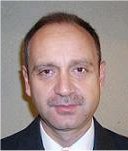|
Plenary
Lecture
Diagnosis of Flexible Artificial Social Systems

Associate Professor Calin I. Ciufudean
"Stefan Cel Mare" Universtity of Suceava
Faculty of Electrical Engineering and Computer Science
Department of Automatics and Computers
9, University str., RO720225, Suceava
ROMANIA
E-mail:
ciufudean.calin@yahoo.com
Abstract:
A major consideration in designing a flexible
manufacturing system is its availability. When a machine
or any other hardware component of the system fails, the
system reconfiguration is often less than perfect. It is
shown that, if these imperfections constitute even a
very small percent of all possible system faults, the
availability of the system may be considerably reduced.
A state is operational when its performance is better
than a threshold value. In order to calculate the
availability of a manufacturing system, its states (each
corresponding to an acceptable system level) are
determined. A system level is acceptable when its
production capacity is satisfied. To analyze the system
with failure/repair processes, Petri nets and Markov
models are often used. As a manufacturing system
includes a large number of components with
failure/repair processes, the system-level discrete
event model becomes computationally intractable. Our
approach for the analysis of manufacturing systems
assumes that the systems are decomposed in manufacturing
cells. We focus on the diagnosis of the performance
characteristics of workflows cells modelled with
stochastic Petri nets (SPNs). This goal is achieved by
using a new model for Artificial Social Systems (ASSs)
behaviours, and by introducing equivalent transfer
functions for SPNs.
ASSs exist in practically every multi-agent system, and
play a major role in the performance and effectiveness
chart of the agents. This is the reason why we introduce
a suggestive model for ASSs. To model complex systems,
such as flexible manufacturing ones, a class of Petri
nets is developed, and briefly introduced.
This class allows representing the flow of physical
resources and control information data of the Flexible
Artificial Social Systems (FASSs) components. In the
analysis of SPN we use simulations in respect to timing
parameters in a generalized semi-Markov process (GSMP).
By using existing results on perturbation analysis
(e.g., delays in supply with raw materials, equipment
failure, etc.), and by extending them to new physical
interpretations, we address unbiased sensitivity
estimators correlated with practical solutions in order
to attenuate the perturbations.
The novelty of the approach is that the construction of
large Markov chains is not required. Using a structural
decomposition, the construction system is divided into
cells. We can simplify the structure of the SPN using
the presented approach, which is useful when we deal
with complex Petri nets, and we need to simplify these
structures (e.g. graphs) in order to analyze them
properly. For each cell a Markov model was derived and
the probability was determined for at least Ni working
machines in cell i, for i = 1,2,..,n and Mj , where j=1,
..., m, working material handling system (MHS) at time
t, where Ni and Mj satisfy the system production
capacity requirements. Intuitively, bottleneck (BN) of a
production line is understood as a machine that impedes
the system performance in the strongest manner.
Identification of BNs and their optimal capacity for
avoiding the machines downtime is considered as one of
the most important problems in manufacturing systems.
Some examples illustrate this approach.
Brief Biography of the Speaker:
• Academic Positions: Assoc. Professor Ph.D. Eng., Dept.
of Automatics and Computers, Faculty of Electrical
Engineering and Computer Science, "Stefan cel Mare"
University of Suceava, Romania.
• Fields of Scientific Activities: Discrete Event
Systems, Complex Measurement Systems, Reliability and
Diagnosis of Control Systems, Environmental Management.
• He published 8 books and over 140 scientific papers in
conference proceedings and journals.
• Honor Member of the Romanian Society of Electrical &
Control Engineering - Member of the Romanian Technical
Experts Corp.
• Technical Expert of the Romanian Ministry of Justice.
• President of the Romanian Society of Electrical &
Control Engineering, Suceava Branch.
• He is a member of the editorial boards of several
international scientific journals and conferences of
control systems and electric engineering science. He was
designated chairmen at 21 international conferences.
|
